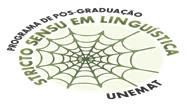Banca de DEFESA: MARIA LUIZA DE CASTRO
Uma banca de DEFESA de DOUTORADO foi cadastrada pelo programa.DISCENTE : MARIA LUIZA DE CASTRO
DATA : 21/03/2024
HORA: 11:00
LOCAL: PPGL
TÍTULO:
THE PRESENCE OF "WE" AND "US" IN QUILOMBOLA COMMUNITIES IN MATO GROSSO-BRAZIL
PALAVRAS-CHAVES:
Ecological Linguistics. Linguistic Variety. Quilombola Communities.
PÁGINAS: 124
GRANDE ÁREA: Lingüística, Letras e Artes
ÁREA: Lingüística
SUBÁREA: Sociolingüística e Dialetologia
RESUMO:
The central objective of this research is to describe and analyze pronominal variability between "nós" (we) and "a gente" (a colloquial form of we) in the speech of residents of the Quilombola communities of Baixio, Laranjal, Campina de Pedra, and Morrinhos, all located in the state of Mato Grosso. The aim is to examine the trends in the pronominal forms adopted by these residents. Subsequently, a comparison of these results is undertaken to determine if the trends regarding these two variables are consistent across the communities. This work falls within the research line of the Study of Variation and Change Processes, with a focus on the Study of Linguistic Processes in the Stricto Sensu Graduate Program in Linguistics at Unemat, Cáceres campus. The theoretical framework employed is Ecological Linguistics, proposed by Couto (2012a, 2013b), which provides a holistic view of language by understanding that the study of language interactions within the linguistic ecosystem can encompass social, mental, and natural aspects. This theory is fundamental for understanding the context in which the analyzed community is situated, emphasizing the relevance of colonization history and complex socio-economic relationships that shape dynamics among its members. The analysis corpus was collected (and provided) by researcher Dr. Joachin Steffen from the University of Augsburg, Germany, through interviews with speakers from the four aforementioned locations. Twenty-four interviews were selected for analysis, distributed across two age groups (up to 50 years and over 50 years), gender (male and female), and three education levels (initial, primary, and higher). ELAN was used for data transcription, and the R programming language was employed for statistical analysis. The overall results of this research indicate pronominal alternation between "nós" and "a gente" in both linguistic varieties, with a predominance of the pronoun "nós" in the speech of the communities, agreeing with inflected verbs in both 3rd person singular and 1st person plural. Regarding the pronominal form "a gente," occurrences with the 1st person plural are infrequent, and most are associated with the verbal form in the 3rd person singular. The variable phenomena discussed here present distinct configurations in the analyzed communities, influenced in diverse ways by the environments in which they are situated.
MEMBROS DA BANCA:
Presidente - 127.949.268-61 - ANTONIO CARLOS SANTANA DE SOUZA - UNEMAT
Interno - 80737005 - JOCINEIDE MACEDO KARIM
Interno - 801.692.529-49 - DIRCEL APARECIDA KAILER - UEL
Interno - 019.003.301-05 - ELISANDRA BENEDITA SZUBRIS - NÃO INFORMADO
Externo à Instituição - JOACHIM STEFFEN - UK
Externo à Instituição - MARCELO NICOMEDES DOS REIS SILVA FILHO - UFMA
Externo à Instituição - NEIDE ARAÚJO CASTILHO TENO - UEMS



